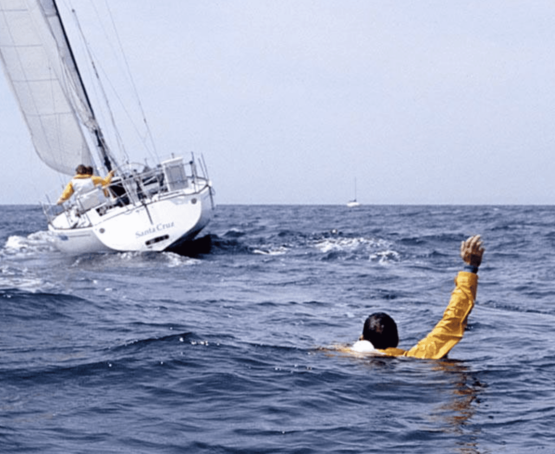Safety Moments, presented at CCA Stations and Posts
By Chuck Hawley, CCA San Francisco Station, January, 2023
Ah, New Year’s Resolutions. So easily suggested; so quickly neglected! Lose 20 pounds, get regular exercise, reduce intake of saturated fat, and cut out that last glass of wine in the evening: we’re very good at making promises to ourselves, and then allowing them to fall by the wayside as the weeks of the new year speed by.
But what about the resolutions we make with regard to the safe operation of our own sailboats and cruisers? How many times have you heard a fellow voyager say “Ya know, the next time we’re out, we ought to do a man overboard drill” or “I need to post instructions for how to broadcast a Mayday in the nav station.” With full knowledge that seamanship resolutions may have the same chance of succeeding as those we make about our behavior on land, I nonetheless suggest that we resolve to do the following:
- Actually do a man-overboard drill, unannounced, with an inanimate object that vaguely simulates a person in the water. A fender and a bucket work reasonably well. Try this on a variety of points of sail, especially off the wind, where some sail adjustment is necessary so the vessel can fetch the victim. You should decide in advance if you are the “victim”, and therefore won’t participate in your own “recovery”.
You can judge the success of the exercise by the smooth operation of the boat as it returns, the control of boat speed, and a lack of direct contact with the “victim”. Is there a practical means of hoisting or reboarding the victim? Can the sails be struck to prevent the boat from sailing away? Would the rescue have been successful? - Take the time to write down the procedure for broadcasting a Mayday or a Pan-Pan. If you’ve got a DSC-equipped radio, make sure the GPS is always on when the VHF is on, or you’ll be missing out on one of the great safety improvements of the 2000s. What is the Coast Guard going to want to know verbally? While the DSC fingerprint will provide a lot of information, a verbal description of the vessel name, nature of the incident, and number of people on board is extremely helpful to the Coast Guard.
If you don’t have a DSC-equipped radio, buy your boat a belated Christmas present and hook it up to your GPS. It’s one of the most cost-effective pieces of gear available. - The other piece of gear that rises to the top of the effectiveness hierarchy is either an EPIRB or PLB. I won’t go into detail about the impact these devices have made on marine safety (you can read articles on the CCA website that are very informative), but the key is that with one of these dedicated marine transmitters, you gain access to a worldwide network of professional rescue services. ‘Nuff said. Carry an EPIRB and ensure that you can get to it in an emergency..
- Check your flares, fire extinguishers, and inflatable life jackets before spring. While the need for aerial flares may be decreasing due to electronics, a three or six pack of hand flares is a damned good idea, that are dated within 42 months of their data of manufacture. Check the gauge on your fire extinguishers, and invert them a half dozen times to free up the agent inside. And take the time to open up your inflatable life jackets to ensure they have a good CO2 cylinder, and replace the bobbin or whatever your device uses to sense the water.
- Finally, and while I realize you all do this religiously (for some, it may be as close to religion as they actually get, but that’s a personal decision), please take the time to give your guests a pre-departure talk about what to expect before you cast off. Important items include finding out who is not a competent swimmer, who is a likely second-in-command, how the head works, and how to avoid head injuries from the boom. Yes, it takes 10 minutes from your time on the water, but it’s the sign of a conscientious skipper who cares about his or her crew, and who exemplifies the high standards of the CCA.
Happy New Year, everyone, and may your voyages, long and short, be safe and pleasant.

